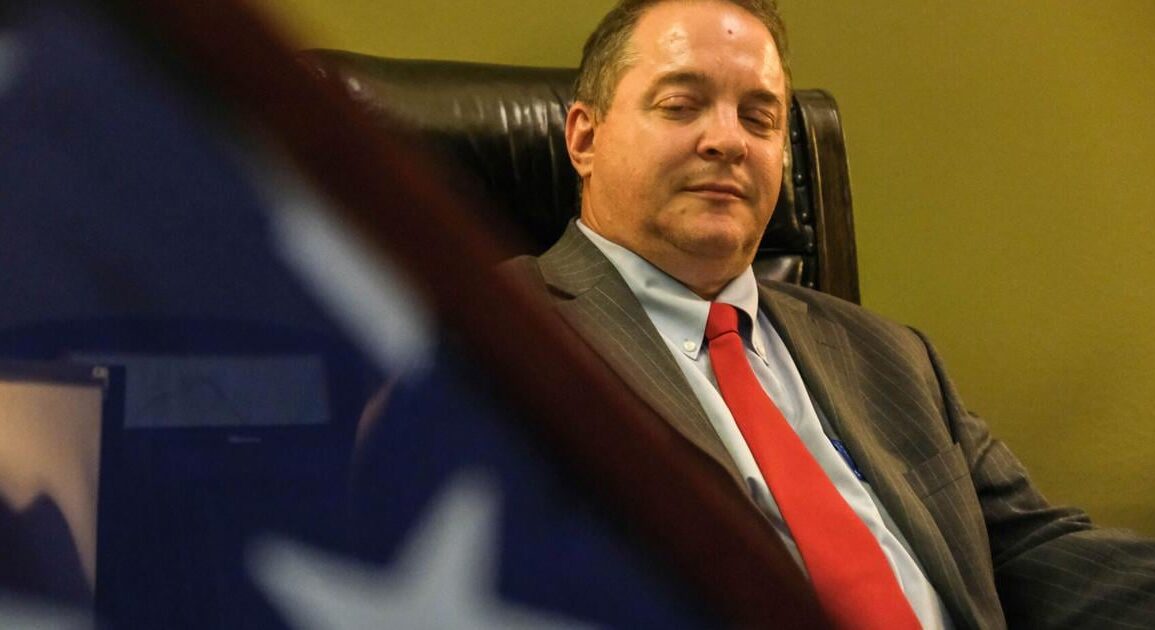
FAIRMONT — Dennis Kittle moved on from the Marion County Prosecutor’s Office last week.
During his time working with lead Prosecutor Jefferey Freeman, Kittle embodied Freeman’s approach to presenting cases from a victim-centered standpoint.
“Dennis did a lot of things and in fact, he got us a specified assigned room in the county complex for a soft interview room,” Freeman said. “So that the victims of these particular types of offenses don’t go through a very clinical and cold atmosphere in trying to recount being victimized so they’re not sort of re-victimized again.”
Kittle spent just under 8 years as an Assistant Marion County Prosecutor, starting in 2015. Originally a defense attorney, he approached then-prosecutor Patrick Wilson with his interest in joining the office. Once in his role, Kittle worked half the time on sexual assault and domestic violence cases, due to a grant obtained by the prosecutor’s office which was awarded for that type of work.
Adding a soft interview room to Marion County’s law enforcement toolkit was one expression of Kittle’s overall role in the prosecutor’s office. A soft interview room provides a warm and comforting space investigators and law enforcement can use to interview a victim of sexual assault or domestic violence. It creates a safe space that encourages a victim to be more responsive to questions and willing to share their story.
“So the soft interview room is basically you walking into your living room right,” Kittle said. “You walk into a warm space. It’s got soft furniture, soft walls, a comfortable environment that makes you feel like you’re just literally sitting in somebody’s living room. And you’re able just to have a conversation.”
During his time at the prosecutor’s office, Kittle became an expert at something called the trauma informed approach to prosecuting sexual assault cases. What that means is that prosecutors and law enforcement structure their work in a way that empowers the victim and lets them feel they’re being heard. It can restore some self esteem and prevent stereotypes or biases from hindering justice. Kittle said he and the other prosecutors in the office have been trained to ask questions in a certain way to allow victims to talk about their experiences in a whole different way.
This can be a powerful approach to handling this type of case, because it also creates a safety net in case a jury decides the prosecution did not deliver a persuasive enough case.
“We’re able to make victims feel more listened to and understanding of the court process,” Kittle said. “So even if you didn’t have a trial that ended with a guilty verdict, whoever it was that was victimized in that trial felt like they were heard, felt like they were cared for and they felt that our office tried to do the best for them.”
The soft interview room is nearing completion, all that’s left is installing cameras and network infrastructure that will allow prosecutors and anyone else in law enforcement the ability to watch an interview remotely.
Cody Corliss, an associate professor at the WVU College of Law and former war crimes prosecutor at the United Nations, said that a trauma informed approach is important because of the historical reluctance of victims of sexual and gender-based violence to report crimes and participate in the criminal justice system. He said that part of the victim-focused approach is to work in a way that makes the victim comfortable with the criminal justice system and work with prosecutors so that a criminal conviction can be achieved for the offender.
“There’s a real paradigm shift in how we think about crime and sexual violence,” Corliss said. “Within the United States, there has been a real push to recognize the severity of these crimes. A victim focused approach to prosecution of these crimes engages victims rather than alienates them.”
Kittle credits Freeman for creating the environment that makes this approach possible. He said that the soft interview room would not have been possible without Freeman’s support.
One thing that has stood out to Kittle is the way drug-related crime has evolved since 2015.
When Kittle began in the prosecutor’s office, drug manufacturing was a homebrew affair, with small capacity production done anywhere from hotel rooms to trailers. Today, much of the manufacturing is done out of state and then transported here. Instead of a few grams of meth, people bring gallon bags of the drug into the county. Fentanyl has also taken drugs that have had their perception softened, such as marijuana, and made them deadly. He said the presence of fentanyl has increased the severity of this and other street drugs.
Kittle joined the law firm Polverini and Norman PLLC where he will work on personal injury and criminal defense. The skills he picked up in the prosecutor’s office will be invaluable to him at his new job. He said he joined because there are people who need competent criminal defense attorneys and it’s his way to give back to the community.
“What you learn quickly is that the people of this county really depend upon you,” Kittle said. “There’s no other way for the people in the county to be able to get any type of resolution to things that have harmed them in the criminal system. So, it was really a tremendous feeling for eight years being able to represent the citizens of Marion County.”
This post was originally published on this site be sure to check out more of their content.







